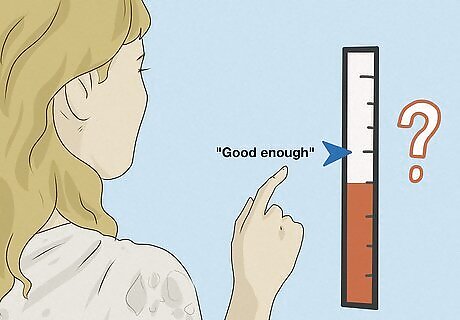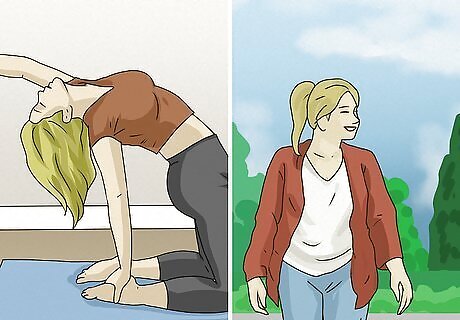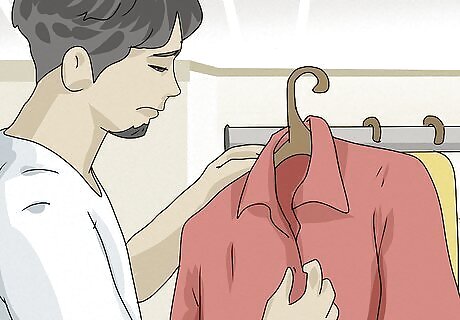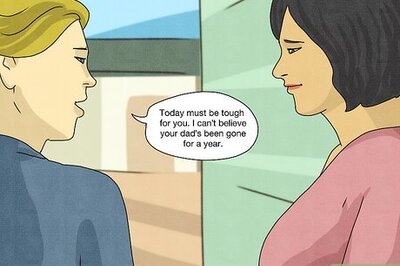
views
- Ask yourself why you feel like you’re not good enough. Reflect on what “good enough” means to you and whether you’re holding yourself to fair standards.
- Accept your imperfections and cut out negative self-talk. Work on cultivating self-love and embracing yourself for who you truly are.
- Talk to your partner about your fears, ask them for their perspective, and be totally honest with them no matter what.
How to Feel Like You’re Enough

Figure out why you don’t feel like you’re good enough. Your perception of yourself may be much harsher than reality. Reflect on your insecurities and feelings to pinpoint why you feel you aren’t good enough and determine how to fix the issue. It may help you appreciate yourself more! Take time to sit down and ask yourself, “Why do I feel this way?” Give it some honest thought and reflect carefully before drawing conclusions.

Discover what “good enough” means to you. There’s no standard definition of “good enough,” so your feelings might be based on internal standards you set for yourself. If your standards are too high, consider what “good enough” really means to you and decide whether it’s a reasonable standard. Ask what “good enough” means to your partner, too. What are your partner’s values and needs? How do they compare to yours? Once you have a clear definition of “good enough,” it’ll be easier to become the partner you want to be.

Embrace the person you truly are at your core. When you struggle to accept yourself, it’s hard to believe you’re worthy of someone else. Even hearing your partner say “I love you” may not dispel your fears and doubts. Practice positive affirmations and remind yourself of your strengths to cultivate self-love. Eliminate negative self-talk. Turn negative thoughts into positive statements, like "I'm worthy of love" instead of "I'm not enough." Stop comparing yourself to others or dwelling on regrets. Focus on moving forward and loving yourself for all you’ve accomplished.

Accept your imperfections. Your imperfections make you unique, and that’s a good thing! Embrace the idea of using your imperfections as opportunities to grow—not because you need to prove yourself to anyone, but so you can enjoy life to the fullest. Remind yourself that being a partner is about working with what you’ve got, not sacrificing parts of yourself to make someone happy. You can be an amazing partner exactly as you are—imperfections and all.

Be totally honest with your partner and yourself. Being “good enough” as a partner means taking responsibility for yourself and your promises. Rather than prove your worth with grand gestures, simply be honest, stay true to yourself, and be there for your partner when you say you will. Show up when you agree to do a favor or help them work through something tough because you promised to support them. Do things because you love your partner—not because you’re afraid that you’re “not good enough.” Make sure they don’t take advantage of your kindness; don’t be afraid to set boundaries to dictate what you will and won’t do.

Listen to your partner and ask them what they need. Understanding your partner’s needs helps you be a better partner—so listen actively to them. Pay attention to their values, ideals, and the things they need help with most. Be there selflessly in ways that will make a genuine difference in their life. If you focus too much on what you think you should do for your partner, you might not pick up on what they really need. Set your ego aside and put yourself in your partner’s shoes to figure out how to be there for them.

Stop yourself from putting your partner on a pedestal. You may be idealizing your partner and seeing them as “perfect” when they’re not. Take note of their flaws as well as their good qualities. If you love them, flaws and all, why shouldn’t they love you and your flaws too? You don’t need to point out your partner’s flaws. Just notice them and remind yourself that neither of you is perfect.

Discuss your feelings with your partner. Have an honest conversation about your feelings of inadequacy. Your partner might not even know you feel that way, and odds are they’ll want to reassure you. Be vulnerable, talk about how you feel, and open up the conversation to get your partner’s perspective, too. At worst, they might suggest ways to be a better partner. This gives you the chance to see if they have a good reason to feel as they do. An honest conversation can ease your worries and give both of you a better idea of the other’s needs. Try writing in a journal. If your worries feel overwhelming, journaling can help you get things off your chest.

Let go of past insecurities. You might feel like you’re not enough if you have childhood trauma or trauma from a past relationship. If so, work through those insecurities and let go of them. Your partner isn’t the same person who cheated, left you, or hurt you in some other way—they’re here for you! It’s okay if it takes time to work through your insecurities. If you’re struggling, talking to a therapist may help.

Work toward self-improvement on your own terms. Consider what you can do (whether it’s an addition to your daily routine, a healthy habit, or a form of self-care) to boost your confidence. Take it slow, try one new thing at a time, and adopt habits or hobbies that bring you joy. For example: Meditate for 5 to 10 minutes each day. Establish an exercise routine. Get a new haircut. Pick up a hobby you’ve always wanted to try. Start a book club with your friends. Spend a little time outdoors every day. Change your sleeping schedule to get as much as you need. Eat only when you’re hungry and stop when you’re full. Refresh your wardrobe with clothes that feel comfortable. Get your nails done.

Remind yourself that you’re already enough. Part of accepting yourself is acknowledging that you’ve always been enough—even if you don’t feel like it sometimes. You may make mistakes along the way, and that’s okay. So long as you’re trying your best to be a supportive, loving partner, you’ve got everything you need to “be enough.”
Why do you feel like you’re not enough?

Self-doubt or low self-esteem may make you feel inadequate. Love coach Lisa Shield says that insecurity “comes out of a lack of self-love and lack of self-confidence.” You might feel like it’s impossible for anyone to love you (even if your partner truly does). Other reasons might include: You compare your accomplishments to your partner’s. You might worry they’ll leave you for someone more successful (or worry about how they see you and your accomplishments). You’re still dealing with some kind of childhood trauma. If you endured something like the death of a loved one or abandonment from someone you trusted, the associated trauma might make you feel bad about yourself and assume you’re “not enough.” Your partner spends time away from you. Whether they’re busy, traveling, or the two of you don’t live together yet, you might worry about being “enough” when you’re alone or that your sex life together isn’t as active as it used to be. You don’t go out as much as your partner does. If you’re introverted, you may wonder if your partner needs someone more outgoing and sociable, even if your partner says they’re happy with the way things are. You don’t have a support system to rely on. Love coach Lisa Shield says it’s “super important to have a good, strong support system” to give you encouragement and remind you that you’re a worthy partner. “That means family and friends whom you can count on…who are positive and really have your back.” Your partner neglects you or is mean to you. Ultimately, your partner’s actions aren’t your fault. Whether they’re just busy at work, have family obligations, or are choosing to be mean, remember that it’s about them, not you.
Coping with Unworthiness in Relationships

Make changes in the relationship if your partner makes you feel unworthy. Whether it's intentional or not, you don't deserve to feel like you're "not enough" because of your partner. Try the following tactics to change your relationship for the better: Reflect on your feelings. Figure out why you feel this way and when you started having feelings of inadequacy. Was it something your partner said? Why did it stick with you? Get a little distance from them. It’s okay to step away from your partner if they’re making you feel bad about yourself. Decompress, build up confidence, and figure out what you want to do next. Discuss the issue with your partner. Have a long talk with your partner and tell them how you feel. They may not realize they’re making you feel unworthy. They’ll likely be willing to fix the problem with you. Talk to a relationship therapist. It’s tough to change your mindset or work through your feelings alone. Love coach Lisa Shield adds that “many of us don’t have a good enough understanding of what we did wrong. So how are we going to prevent it from happening again? Getting help from therapy or good coaching is super important.” Recognize when it’s best to end the relationship. If your partner doesn’t care about your feelings and won't change, don’t feel guilty for walking away. “If you’re holding onto somebody that can’t give you what you want, you have to completely cut it off and move forward,” adds love coach Lisa Shield.



















Comments
0 comment